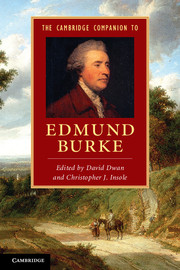Book contents
- Frontmatter
- Contents
- Contributors
- Acknowledgements
- Method of Citation
- Chronology
- Introduction Philosophy in Action
- 1 Burke’s Life
- 2 Burke, Enlightenment and Romanticism
- 3 Burke as Rhetorician and Orator
- 4 Burke’s Aesthetic Psychology
- 5 Burke on Law and Legal Theory
- 6 Burke on Political Economy
- 7 Burke and Religion
- 8 Burke and the Constitution
- 9 Burke and the Natural Law
- 10 Burke and Utility
- 11 Burke and the Ends of Empire
- 12 Burke and the American Crisis
- 13 Burke on India
- 14 Burke and Ireland
- 15 Reflections on the Revolution in France
- 16 Burke’s Counter-Revolutionary Writings
- 17 Burke in the United States
- Further Reading
- Index
- References
4 - Burke’s Aesthetic Psychology
Published online by Cambridge University Press: 05 December 2012
- Frontmatter
- Contents
- Contributors
- Acknowledgements
- Method of Citation
- Chronology
- Introduction Philosophy in Action
- 1 Burke’s Life
- 2 Burke, Enlightenment and Romanticism
- 3 Burke as Rhetorician and Orator
- 4 Burke’s Aesthetic Psychology
- 5 Burke on Law and Legal Theory
- 6 Burke on Political Economy
- 7 Burke and Religion
- 8 Burke and the Constitution
- 9 Burke and the Natural Law
- 10 Burke and Utility
- 11 Burke and the Ends of Empire
- 12 Burke and the American Crisis
- 13 Burke on India
- 14 Burke and Ireland
- 15 Reflections on the Revolution in France
- 16 Burke’s Counter-Revolutionary Writings
- 17 Burke in the United States
- Further Reading
- Index
- References
Summary
Edmund Burke’s Philosophical Enquiry into the Origin of our Ideas of the Sublime and Beautiful (1757; expanded second edition, 1759) acts as a sort of midwife at the birth of modern aesthetic theory, but really it belongs to the pre-history of the discipline. Burke never uses the term ‘aesthetic’, and he is unlikely to have known that the German philosopher Alexander Baumgarten had recently adopted the word to describe the ‘criticism of taste’ in his treatise Aesthetica (1750). The true etymology of ‘aesthetic’ – the Greek aisthetikos means ‘pertaining to what the senses perceive’ – was much insisted upon by Immanuel Kant in 1781, who pointed out that any such science is by definition empirical, and confined to the mechanics of sensual perception. Modern aesthetics begins with Kant’s disappointment at Burke’s refusal to move beyond such preliminaries in the Philosophical Enquiry. Kant calls for a new a priori or ‘transcendental aesthetics’, one that establishes a synthetic system for how sensible objects ought to be judged, rather than merely reporting how they are judged. Likewise, Hegel declares at the beginning of his lectures on aesthetics that he must break with the old application of ‘aesthetics’ to works of art ‘with regard to the feelings they were supposed to produce, as, for instance, the feeling of pleasure, admiration, fear, pity, and so on’. Burke, for his own part, insists that the most interesting effects of sublime and beautiful objects strike us before we can reason about them or judge them. By the standards of his contemporaries, Burke’s Philosophical Enquiry was not particularly philosophical.
And yet the Philosophical Enquiry is much more than a museum piece, consigned to the footnotes of philosophy by the German Idealists. It demands to be read in the context of its own controversies – even though the polemical nature of Burke’s engagement with those controversies is often concealed behind a screen of polite methodicality.
- Type
- Chapter
- Information
- The Cambridge Companion to Edmund Burke , pp. 53 - 66Publisher: Cambridge University PressPrint publication year: 2012
References
- 1
- Cited by



